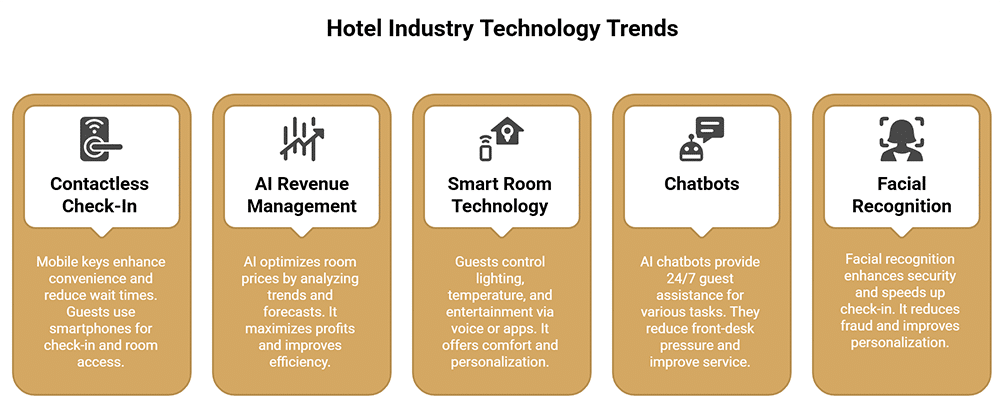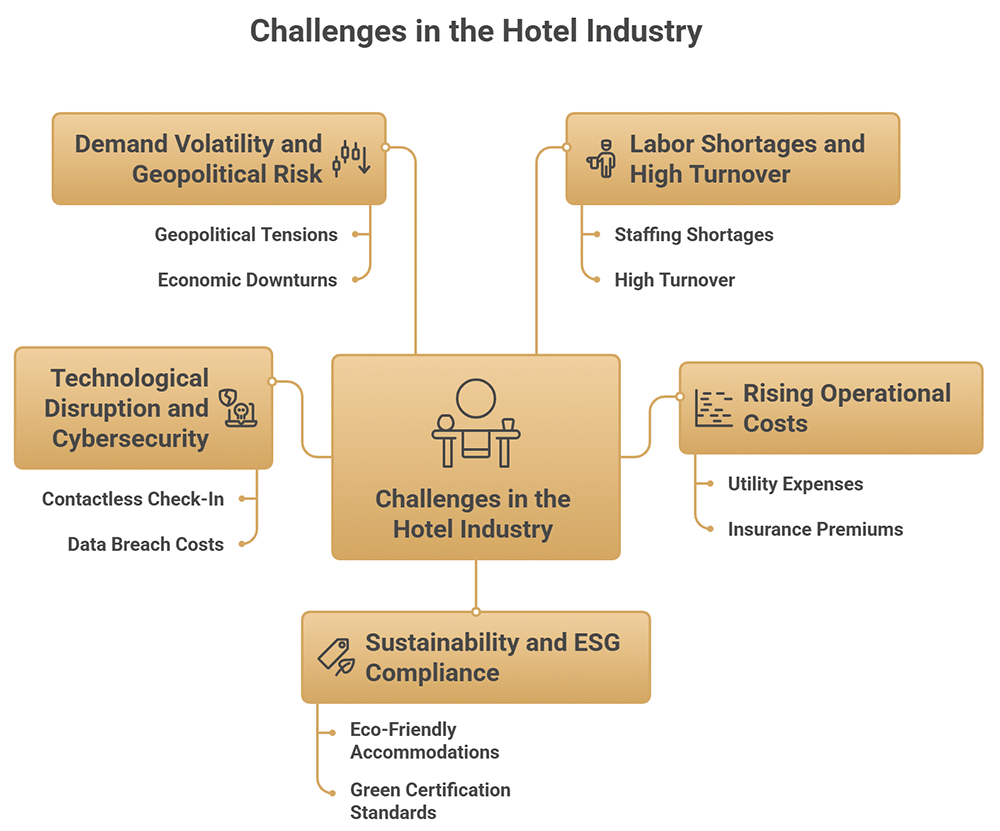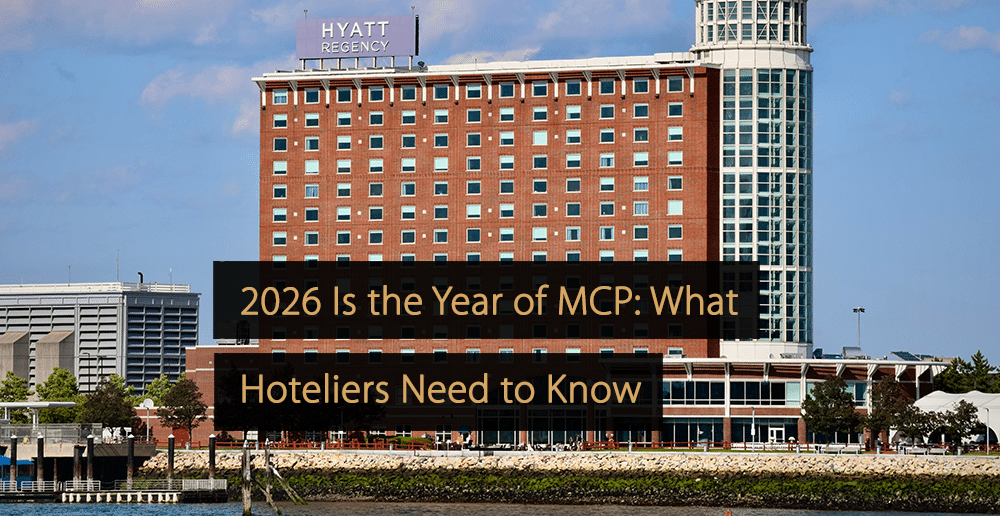The hotel industry is one of the most important components of the wider service industry, catering to customers who require overnight accommodation. It is closely associated with the travel and hospitality industries, although there are notable differences in scope. In this article, you will learn more about the hotel industry, its links to other service industry sectors, and the range of hotel and guest accommodation types.
Table of Contents:
- What is a Hotel?
- What is the Hotel Industry?
- The Difference Between the Hotel Industry and the Hospitality Industry
- Different Types of Accommodation in the Hotel Industry
- Significance of Star Ratings in the Hotel Industry
- Hotel Marketing Strategies
- Hotel Revenue Management
- Technology Trends in the Hotel Industry
- Consumer Trends in The Hotel Industry
- Hotel Management
- Understanding the Different Hotel Positions
- Economic Impact of the Hotel Industry
- Tips to Boost Your Hotel Career Prospects
- Job Boards for Finding a Job in the Hotel Industry
- Channels to Find Hotel Management Jobs
- Find Hotel Vacancies With These Chains
- Finding Your Next Hotel Manager Position
- Tips for Hiring the Best Hotel Staff
- A Global List of Hotel Schools
- A List of the Most Popular Hotel Management Courses
- Hotel Course: Learn Skills for the Hotel Industry
- Operational Challenges and Strategic Solutions
- Future Outlook: The Hotel Industry Through 2035
- Free Revenue Management & Hotel Marketing Handbook
- Other Related Industries
What Is a Hotel?
Broadly speaking, a hotel is a managed building or establishment that provides guests with a place to stay overnight, on a short-term basis, in exchange for money. The precise features and services provided to guests can vary quite drastically from one hotel to another.
Hotel owners aim to attract a particular type of customer through their pricing model and marketing strategy or via the range of services they offer.
What Is the Hotel Industry?
Next, it is important to answer the question: What is the hotel industry? Put simply, the hotel industry is the section of the service industry that deals with guest accommodation or lodgings. By most definitions, the hotel industry refers to hotels and many other forms of overnight accommodation, including hostels, motels, inns, and guest houses. According to the Hotels Market – Global Industry Analysis and Forecast by MMR, the hotel market is expected to reach $1663.82 billion by 2029.
However, it does not usually include long-term or permanent forms of accommodation. Due to the nature of hotel services, it is closely associated with the travel and tourism industry.
The Difference Between the Hotel Industry and the Hospitality Industry
One common area of confusion concerns the difference between the hotel and the hospitality industry, with many people mistakenly believing the two terms refer to the same thing. However, while there is a crossover, the difference is that the hospitality industry is broader in scope and includes multiple different sectors.
The hotel industry is solely concerned with providing guest accommodation and related services. By contrast, the hospitality industry is concerned with leisure in a more general sense. As a result, it covers accommodation, restaurants, bars, cafés, nightlife, and many travel and tourism services.
Table: Difference Between Hotel and Hospitality Industry
| Aspect | Hotel Industry | Hospitality Industry |
|---|---|---|
| Primary Focus | Providing accommodations and lodging services to guests. | Encompasses a broader range of services and experiences, including accommodations, dining, entertainment, events, and customer service. |
| Scope of Services | Primarily focuses on providing rooms, amenities, and related services within a physical property. | Offers a wide spectrum of services beyond lodging, such as restaurants, bars, events, catering, and entertainment, often integrated into a holistic guest experience. |
| Business Model | Revenue is generated primarily through room bookings, rates, and occupancy levels. | Revenue streams come from various sources, including room bookings, dining, events, and guest experiences, making it more diverse and complex. |
Different Types of Accommodation in the Hotel Industry
It is important to understand that the hotel industry is a catch-all term to describe guest accommodation services. With that in mind, it is worth noting that a variety of different accommodation types fall under this umbrella term. According to the Skift report, the global accommodation market, valued at $1.2 trillion, is projected to reach $1.3 trillion by 2026. Some of the main types are described in more detail below:
Hotels
The most common type of accommodation in the hotel industry, a hotel is defined as an establishment that offers overnight accommodation, meals, and other services. They are mainly aimed at travelers or tourists, although locals may also use them. Hotels provide private rooms and almost always have en-suite bathrooms. Big hotel chains are leading the way. For example, Marriott International operates 8,785 properties across 139 countries, while Hilton has 7,530 properties in 123 countries.
Bed and Breakfasts
Bed and breakfasts, or B&Bs, are smaller establishments offering guests private rooms for overnight stays and breakfast in the morning. According to the Mordor Intelligence report, the global B&B market stood at USD 32.16 billion in 2025 and is forecast to reach USD 41.50 billion by 2030, reflecting a 5.2% CAGR over the period. Often, these establishments are converted from private homes, and many B&B owners live on their property. While they are often a budget option, high-end or luxury B&Bs exist.
Motels
Motels are a form of overnight accommodation tailored towards motorists. For this reason, they are typically located conveniently by the roadside and offer ample free parking. A motel will generally have a number of guest rooms and may have some additional facilities, but will usually have fewer amenities than hotels.
Botels
‘Botel’ is the name given to a boat that has been adapted to offer hotel-style lodgings. Many botels are permanently moored riverboats, although others are converted ships, which can travel with guests onboard. They are especially popular in European cities with rivers or canals.
Inns
An inn is an establishment that provides temporary accommodation, usually along with food and drinks. Inns are smaller than hotels and are closer in size to bed and breakfasts, although inns are often slightly larger. Guests are allocated private rooms; food options usually include breakfast and dinner.
Resorts
Resorts are commercial establishments, usually consisting of a hotel and a variety of on-site services and amenities. Guests will usually have access to lodgings, restaurants, bars, entertainment options, recreational activities, and shops, which can all be accessed without leaving the premises. According to Grand View Research, the global resort market size is projected to reach USD 945.4 billion from USD 347.1 billion by 2030, growing at a CAGR of 18.5% from 2025 to 2030.
Serviced Apartments
Popular among business travelers, serviced apartments are apartment-style lodgings, where guests benefit from a full range of services, such as room service, housekeeping, and laundry services. According to Market.us, the Global Serviced Apartment Market size is expected to be worth around USD 397.7 billion by 2034, from USD 120.3 billion in 2024, growing at a CAGR of 12.7%. Most serviced apartments also offer additional amenities, while the apartments tend to be larger than most hotel rooms.
Hostals
Often confused with hostels, a hostal is a form of accommodation primarily found in Spanish-speaking regions. They resemble a budget hotel, offering either private bedrooms or apartments, while they may also have a bar, restaurant, and/or café. Most hostals are family-owned, and guests may sometimes share bathrooms with others.
Hostels
A hostel is a form of accommodation, typically aimed at those on a budget, where multiple guests sleep in different beds in the same living space. According to Grand View Research, the global hostel market size is projected to reach USD 11.04 billion by 2030, up from USD 7.21 billion in 2024, growing at a CAGR of 6.5% from 2024 to 2030. Effectively, guests pay for a bed, rather than a private room, and hostels hold a particular appeal for those looking to meet new people. Guests will usually share kitchen and bathroom facilities.
Video: What Is A Hostel?
Apartment Hotels
An apartment hotel is essentially an apartment building that operates hotel-style services. It provides a similar experience to renting an apartment, albeit with the option to check in and out on demand rather than signing a fixed-term contract. These hotels will generally also provide basic housekeeping services.
Boutique Hotels
Often promoted based on aspiration and luxury, boutique hotels are hotels situated within relatively small buildings. In most instances, they provide guests with upmarket rooms and high-quality services. They often have a particular theme and are commonly found in trendy urban areas. According to Market.US research, the Global Boutique Hotel Market size is expected to be worth around USD 50.5 billion by 2034, growing at a CAGR of 7.2% during the forecast period from 2025 to 2034.
Condo Hotels
A condo hotel is a condominium building that operates as a hotel, allowing guests to rent a condominium unit for a short period. They are almost exclusively found in cities, are especially popular in the United States, and combine the holiday home experience with hotel-style service features.
Eco Hotels
The basic definition of an eco-hotel is a hotel that has taken steps to embrace sustainable living practices to minimize the environmental damage they are responsible for. They may prioritize the use of local products, adopt recycling measures, focus on energy saving, and use sustainable bed linen and towels. According to Future Market Insights, the global ecotel tourism market is valued at USD 190 billion in 2025 and is expected to reach USD 360 billion by 2035, at a CAGR of 6.5% during the forecast period.
Guest Houses
Typically, a guest house is a private house that has been converted to provide guest lodgings. It is crucial for the guest area to be kept completely separate from the other areas, where the owner may live. Some guesthouses provide additional services, but many are operated on a self-service basis.
Holiday Cottages
A holiday cottage, also known as a holiday home or vacation rental, is simply a cottage or small house left to people temporarily for holiday purposes. Essentially, a guest pays to use the property for a short period of time. According to Fortune Business Insights, the vacation rental market size is projected to grow from USD 195.45 billion in 2025 to USD 396.93 billion by 2032, exhibiting a CAGR of 10.65% during the forecast period. They are especially common in the UK, US, and Canada, and a key advantage is the freedom they offer guests. Europe dominated the vacation rentals market with a market share of 89.47% in 2024.
Pensions
Pensions are a form of the guest house, similar to bed and breakfasts, while providing more meals throughout the day. In most cases, guests have an option of different plans, such as full board, where they get breakfast, lunch, and dinner, or half board, where they may get breakfast and dinner, without lunch.
Pop-Up Hotels
A pop-up hotel is a name given to a hotel that is housed within a non-permanent structure. Typically, pop-up hotels exist for a short period of time only. They are most commonly associated with outdoor events, but pop-up hotels may also be established for a particular time of year, such as Christmas or the summer. The Pop-up Hotels Market is expected to reach USD 40.8 billion and is likely to surge at a CAGR of 6.0% during the forecast period from 2025 to 2035, according to a Future Market Insights report.
Roadhouses
Finally, roadhouses are relatively small establishments situated next to a road to attract passing customers. In some ways, they combine the features of a motel, B&B, and inn. They often offer several private guest rooms, similar to a B&B, and may also have a restaurant and/or a bar.
Significance of Star Ratings in the Hotel Industry
Within the hotel industry, star ratings are used to measure the quality of hotels. Although there is no international standard for defining what star ratings mean, the most popular version of this system is associated with the Forbes Travel Guide, where hotels are rated based on established criteria.
Star ratings carry huge significance within the hotel industry because so many customers take the time to research hotels before making a booking. Although word of mouth and feedback from other customers are important, star ratings can carry extra weight because evaluators have experience with many different properties.
The significance of hotel star ratings is further highlighted by the steps that those in the hotel industry take to achieve higher ratings, and this is for a good reason. Moving up a star rating can help hotels to generate more bookings and charge higher rates while moving down can have the exact opposite effect.
You can learn more about how star ratings work, how they can influence customers, and view a breakdown of what each star rating means by reading “The Hotel Star Rating System: Types, Benefits, Significance, Examples”.
Hotel Marketing Trends and Strategies
Hotel marketing is crucial in helping owners maximize bookings and revenue. After all, it is the main way in which those in the hotel industry can reach out to potential guests, conveying their unique selling proposition, brand values, and why guests should choose to stay with them.
Do you want to learn more about hotel marketing? In the articles “The Latest Hotel Marketing Trends in the Hotel Industry” and “Essential Hotel Marketing Strategies,” you find the latest hotel marketing trends and strategies.
Hotel Revenue Management
Hotel revenue management enables owners to predict demand levels and optimize distribution and pricing to maximize financial results. Direct bookings are the best way of maximizing profits. According to the Hotel And Other Travel Accommodation Global Market Opportunities And Strategies To 2031 by Research and Markets, the direct online bookings market will gain $226.6 billion of global annual sales by 2026. In the article “What is Hotel Revenue Management?”, you will find out more about hotel revenue management, the reasons it is so valuable to hotel owners, and the necessary conditions for implementing a hotel revenue management strategy.
Hotel Technology Trends
Hotel technology has advanced in leaps and bounds in recent years. Not only are “smart” systems entirely prevalent, but guests can expect to enjoy more interactive experiences than ever before.
1. Contactless Check-In and Digital Keys
Contactless check-in and mobile room keys have become standard in modern hospitality. Guests can now use their smartphones to check in, access rooms, and request services without physical interaction. According to an Oracle study, 73% of travelers prefer hotels that offer mobile check-in. This innovation not only improves guest satisfaction but also reduces staff workload and operational bottlenecks. Hotels embracing contactless systems are also better prepared for health-conscious travelers seeking low-touch experiences post-pandemic. For example, Hilton’s Digital Key is now used in over 80% of its properties, reducing check-in time to under 60 seconds.
2. AI-Powered Revenue Management Systems
Artificial Intelligence is revolutionizing pricing strategy through dynamic revenue management systems. These platforms analyze booking trends, competitor rates, demand forecasts, and market behavior to optimize room prices in real time. According to Hotel Tech News, hotels using AI-based pricing tools saw RevPAR increases of up to 10%. This precision helps maximize profits while maintaining competitiveness. Beyond pricing, AI also predicts booking windows and cancellation patterns, enabling better inventory and staffing decisions. As labor and marketing costs rise, intelligent revenue management provides a powerful edge in boosting profitability and operational efficiency.
3. Smart Room Technology
Smart rooms are transforming the in-room guest experience. Using IoT devices, guests can control lighting, temperature, curtains, and entertainment via voice or smartphone apps. According to Hospitality Technology, 60% of guests say they’re more likely to return to hotels offering smart room features. As a result, 76% of hotels and resorts have implemented IoT technology for smart guest engagement and security systems. 67% of hotels already use IoT for energy management as per Starfleet Research. One great example is Marriott International’s IoT Guestroom Lab. The technology inside the IoT Guest Room Lab allows guests to ask a virtual assistant for a 6:30 AM wake-up alarm, to start a yoga routine on a full-length mirror, and perform other operations, all by voice or app
4. Chatbots and Virtual Concierge Services
AI-powered chatbots and virtual concierges offer 24/7 guest assistance for tasks like room service, local recommendations, and FAQs. This technology reduces front-desk pressure and ensures fast, consistent responses. According to Hospitality Net analysis, 74% of travelers find AI chat services helpful during their stay. Chatbots can be integrated into websites, apps, or messaging platforms, providing multi-channel accessibility. Hilton’s Xiao Xi Chatbot is a great example. The chatbot assists Hilton members and guests with answers to questions, including hotel information, local weather, and current promotions. With a 94% customer satisfaction rating, Xiao Xi has replied to more than 50,000 customer queries since its launch.

Andrew Kavanagh, Group Sales and Marketing Manager, FBD Hotels & Resorts“Chatbots are certainly a fast-changing and improving tool for hoteliers and guests. I’ve had some experience of early-stage versions which were quite primitive but even then, you could see how they were learning and developing. They work for certain types of guests more than others. A corporate guest who knows what they want, might have a direct question where a chatbot can save them considerable time browsing the entire website. We are now seeing it form part of the online check-in, which in itself makes that process much more efficient and convenient. From the hotelier’s point of view, the chatbot can often help you identify high potential business opportunities that you might have otherwise lost. For example, an overseas guest on the other side of the world browsing your website at 2am local time, helping that guest with a query for their long-stay, or at the very least, making a record and collecting the contact details for a human agent to contact them as soon as possible.” Click here to read more tips from our Hospitality Marketing Expert Panel. |
5. Facial Recognition and Biometric Security
Facial recognition technology is being adopted in high-end hotels for secure, seamless check-in, room access, and payment authentication. In a study by Statista, 46% of hotel guests expressed comfort with facial recognition if it improved service speed and safety. Biometrics also reduces the risk of fraud and unauthorized room access. Though implementation costs are high, the long-term benefits in security, personalization, and operational efficiency make it appealing, especially in luxury and tech-forward properties. For example, the Marriott Rand Tower Hotel in Minneapolis has already adopted this trend by installing Sentry Health Kiosks equipped with FaceMe® facial recognition technology. These kiosks perform temperature checks, mask detection, and even hand sanitizer dispensing.
Terry Schulenburg, VP of Business Development at CyberLink, states:
“Fingerprint technology is a proven technology, but you must deal with the environment. Humidity, dry air, and other environmental elements all cause issues with fingerprint reads. In hotels, where multiple people will be using the fingerprint reader, the transfer of diseases can occur by touching the fingerprint pad after a sick person does. Additionally, fingerprint readers are some of the easiest to spoof because I can wear someone’s fingerprint on my finger and check in as someone else very easily. With facial recognition technology, you don’t have to worry about environmental conditions. … Nothing needs to be touched, and spoofing the system, even with a photo or mask, is nearly impossible.”
In the article “The Latest Hotel Technology Trends,” you find the latest hotel technology trends and what these might signify for the hotel industry.
Consumer Trends in The Hotel Industry
The world is moving faster than ever as shifting social attitudes, new technologies, and economic and demographic changes all drive seismic shifts in how we live, do business, and work. Nowhere is this more obvious than in hotel industry trends. Some hotel industry trends may come and go, while others become enduring features.
Staying on top of trends is vital to reap the profits of early adoption. In the article “Hotel Industry Trends: Keep Up With The Latest Developments!”, you find the latest movements.
Hotel Management
The hotel industry is one of the fastest-growing sectors in the 21st century. Hotel management plays a vital role in this industry, and such a business comes with many responsibilities. Only the most qualified people can take on such roles, so if you are ready for this exciting job opportunity, it will help you grow personally and professionally.
You should refer to this informative guide, ‘Hotel Management: Everything You Need to Know About Managing a Hotel!’, for first-hand information on how to start a career in the highly competitive hotel industry.
Understanding the Different Hotel Industry Positions
Success in the hotel industry means ensuring that all departments work effectively. Within any given property, people are working in a large number of different hotel positions, and it is beneficial to have an understanding of which jobs exist and what those people are actually doing.
In “Hotel Positions: Overview of All Positions Within a Hotel” you will find a concise breakdown of the key hotel job roles and their main responsibilities.
Economic Impact of the Hotel Industry
The hotel industry helps the economy by creating jobs, bringing in money, improving local areas, and attracting tourists and businesses from around the world.
1. Job Creation and Employment Opportunities
The hotel industry is a major global employer, providing millions of jobs across various skill levels, from front desk agents and housekeepers to managers and IT professionals. According to the World Travel & Tourism Council (WTTC), the travel and tourism sector supported over 330 million jobs globally in 2023, with hotels accounting for a major share. The industry also creates indirect employment in related sectors like transportation, food supply, event planning, and entertainment. Especially in developing regions, hotel growth plays a key role in reducing unemployment and supporting local livelihoods.
2. Contribution to GDP
Hotels are a major part of the global economy, generating revenue through bookings, dining, events, and services. According to AHLA, the U.S. hotel industry alone consists of approximately 62,500 properties with 5.6 million guestrooms, selling nearly 1.3 billion room nights each year. The World Travel & Tourism Council projects that the hotel industry will contribute $16.0 trillion to global GDP by 2034, representing 11.4% of the world economy. This includes both direct contributions (hotel operations) and indirect effects (supplier spending, induced income). In tourism-dependent countries, especially island nations and heritage destinations, hotels often account for a large percentage of GDP and are critical to economic stability.
3. Increase in Local Infrastructure and Development
Hotel investments often lead to broader infrastructure improvements in transportation, utilities, and public services. When hotel chains develop in a region, they encourage the upgrading of airports, roads, telecommunications, and sanitation systems. This benefits not just tourists but also local communities. In many cases, hospitality development acts as a catalyst for urban regeneration, particularly in neglected or underdeveloped areas. As more tourists arrive, small businesses, restaurants, markets, and tour operators also thrive, creating a multiplier effect that stimulates overall regional development.
Case Example: Wyndham & Data Centers
In the U.S., Wyndham Hotels saw a boost in revenue for its properties near major data center construction sites. Hotels within ~10 miles of top data center projects outperformed others, with nearly 5% higher RevPAR. This case illustrates how infrastructure projects (often ignored in hotel real estate thinking) can drive demand for accommodations.
4. Foreign Exchange Earnings and Investment Attraction
International hotel guests bring valuable foreign currency into a country, boosting the national economy and strengthening the balance of payments. Hotels, especially those in tourist hotspots, become key contributors to foreign exchange reserves. Additionally, global hotel brands often attract foreign direct investment (FDI), bringing capital, expertise, and standards into local markets. This encourages further investment in real estate, tourism services, and destination branding, enhancing the country’s global competitiveness. The hotel industry thus serves as both a magnet and a vehicle for international economic integration.
Tips to Boost Your Hotel Career Prospects
The hotel industry can be extremely competitive, so those exploring hotel careers need to find ways to stand out from the pack. In particular, there are several steps you can take to make sure you develop the right skills, network with the right people, perfect the application process and impress during your interview.
Read “Hotel Careers: Tips to Find a Job in the Hotel Industry” for advice on some of the steps you should take to maximize your chances of landing the hotel job you are looking for.
Job Boards for Finding a Job in the Hotel Industry
Hotel jobs can be varied, rewarding, and engaging, and many will also offer excellent long-term prospects. Nevertheless, finding the role that best suits your preferences and skill set is important. One of the best ways to pinpoint the right job within the hotel industry is to turn to dedicated hotel job boards, and a wide range of these services are available online.
The article “Hotel Jobs: The Best Hotel Job Boards to Boost Your Career“ contains 10 examples.
Channels to Find Hotel Management Jobs
The hotel industry can be extremely competitive, especially when searching for hotel management jobs. For this reason, it can be important to use various methods to find jobs to apply for, ranging from hotel websites and job boards to social media and professional recruitment agencies.
In “Hotel Management Jobs: List of Channels to Find Your Dream Job,” you will find information about the best channels to aid your search for a management position in the hotel industry.
Find Hotel Vacancies With These Chains
If you are looking for a new job in the hotel industry, it may be best to identify potential roles and apply for hotel vacancies using the websites of some of the top hotel chains. In most cases, large hotel companies will include a ‘Careers’ section on their website, providing all the information you need.
By reading the “Hotel Vacancies: List of Hotel Chains to Start Your Career” article, you will learn more about the process of applying for hotel vacancies, along with a list of some of the most successful chains.
Finding Your Next Hotel Manager Position
The hotel industry can be highly competitive, meaning any available hotel manager job is likely to have multiple applicants. To give yourself the greatest chance of landing the role you want, it can be crucial to understand the nature of hotel management and what the job will entail.
In “Hotel Manager: Tips to Find Your Next Hotel Manager Job!” you will find important information about the necessary skills, qualifications, and experience you need and what to can expect from being a hotel manager.
Tips for Hiring the Best Hotel Industry Staff
Within the hotel industry, making sensible hiring decisions can have a huge bearing on whether or not a property is ultimately successful. However, several steps should be followed to identify the positions that need to be filled and ensure you hire the right hotel staff for those positions.
Read “Hotel Staff: How to Hire the Best Staff for Your Hotel” for more information on the importance of hiring, the signs you need to hire new staff, and seven specific tips for recruiting the right people for the right roles.
A Global List of Hotel Schools
If you’re interested in finding out more about a career in the hotel industry, a course of study at a hotel school might be what you’re looking for. In “Hotel Schools: Global List of Hotel Management Schools”, you’ll learn about the advantages of attending a hotel school and the topics you might study. You’ll also be able to read about some of the top schools in the hotel industry and the courses they offer, from short subjects to full degree programs. You can learn about everything from hotel health and safety to running your hotel.
A List of The Most Popular Hotel Management Courses
A hotel management course can really kick-start your career in the hotel industry, building skills and expertise while also allowing you to develop your professional networks and industry contacts.
In “Hotel Management Course: List of The Most Popular Courses”, you’ll learn everything you need about training for management roles in the hotel industry. You’ll learn why a career in hotels is a great idea and how hotel schools can help you. You’ll also find out about the top educators in the field and the kinds of courses they offer.
Hotel Industry Course: Learn Skills for the Hotel Industry
The hotel industry can provide excellent career opportunities, but many require particular skills. Meanwhile, for more advanced positions in the industry, it may be necessary to obtain certain qualifications. Thankfully, many educators offer hotel courses to teach these skills and provide these qualifications.
You can read our “Hotel Course: A List of Courses & Hotel Educators” article to learn more about the nature of these courses, which academic institutions offer them, and how they can assist you in your career.
Video: Different Types of Hotel Positions Within The Hotel Industry
Below is a video where hotel manager Wilson shows you different hotel positions within the hotel industry.
Practical Guide on Revenue Management & Hotel Marketing Strategies
Hotel marketing offers many strategies that hotel owners must be aware of if they want to succeed in this business. You must use the most effective hotel marketing and revenue management strategies to attract as many guests as possible. In the ‘Free Handbook: Revenue Management & Hotel Marketing Strategies’, hotel owners will get all the tips and tricks on the best marketing strategies.
Operational Challenges and Strategic Solutions
Here are five major challenges the hotel industry faces today, each demanding strategic solutions to stay competitive and ensure long-term growth.
1. Labor Shortages and High Turnover
The hospitality sector is experiencing a major talent crisis. According to the American Hotel & Lodging Association’s report, 79% of hotels are facing staffing shortages, with housekeeping being the hardest to fill. This shortage leads to reduced service quality, overworked teams, and slower operations, all of which negatively affect guest satisfaction. Turnover remains high, especially among front-line roles. This not only increases recruitment and training costs but also affects service quality and guest satisfaction. With fewer workers to manage operations, hoteliers must rely more on automation or risk burnout among existing staff.
2. Rising Operational Costs
Hotels are grappling with sharp increases in utility, insurance, and labor expenses. According to CBRE’s Global Hotel Outlook, insurance premiums have increased by 15–20% in many U.S. markets, while energy costs remain volatile globally. Additionally, wage inflation continues as hotels compete for limited talent. These rising expenses are compressing profit margins, especially for midscale and economy hotels that can’t raise room rates fast enough to compensate. To survive, hoteliers must adopt smarter cost-management strategies, invest in energy-efficient systems, and find creative ways to streamline operations. Effective budget control and long-term planning have become critical for maintaining profitability in a volatile economic environment.
3. Sustainability and ESG Compliance
As sustainability becomes a top priority for travelers and regulators, hotels face mounting pressure to meet ESG benchmarks. According to a Booking.com Sustainable Travel Report, 76% of global travelers say they want to stay in eco-friendly accommodations. However, the Sustainable Hospitality Alliance notes that fewer than 25% of hotels globally meet basic green certification standards. Meeting these expectations often requires major changes in infrastructure, supplier relationships, and daily operations. Additionally, upgrading infrastructure to reduce water and energy consumption often requires significant capital investment, which can be especially challenging for independent or aging properties. Sustainability is no longer a trend but a necessity, and failing to act can damage a brand’s reputation and competitiveness.
4. Technological Disruption and Cybersecurity
The rapid adoption of technology, including contactless check-in, digital keys, and AI-powered pricing, improves efficiency but also brings risk. Cybersecurity is especially important, as hotels handle large volumes of sensitive guest data. The Hospitality Technology Study by HospitalityNet reveals that 42% of hoteliers consider cybersecurity a top priority. A single breach can lead to major financial losses and erode customer trust. In fact, IBM’s Cost of a Data Breach Report estimates the average cost per breach in hospitality is $3.36 million. Hotels must balance innovation with digital security, especially as guest data collection increases for personalization.
5. Demand Volatility and Geopolitical Risk
Hotel performance remains highly sensitive to global events. Geopolitical tensions, economic downturns, pandemics, and extreme weather events can all disrupt travel demand overnight. Sudden drops in bookings, canceled events, or changing travel restrictions can disrupt revenue and planning. For example, during COVID-19, global hotel occupancy plummeted to 13% in April 2020, based on STR analysis. Even in 2024–25, rising inflation and conflict zones (e.g., the Middle East, Eastern Europe) continue to affect international bookings. Hotels must remain agile and build resilience into their business models. This includes diversifying markets, offering flexible booking options, and having contingency plans in place. For example, Hilton revised its 2025 revenue growth outlook downward, citing economic uncertainty and reduced discretionary spending, expecting flat to ~2% growth in RevPAR.
Future Outlook: The Hotel Industry Through 2035
The global hotel industry is poised for significant transformation between 2025 and 2035, fueled by shifting consumer preferences, technological disruption, and renewed investment. According to CBRE’s Global Hotel Outlook, most key markets will recover to or exceed pre-pandemic levels by 2025, especially in Asia-Pacific and the Middle East. From there, the industry is expected to grow steadily, with the independent lodging sector projected to reach $800 billion by 2035, up from $281.7 billion in 2025, as forecasted by Future Market Insights.
Key growth drivers include rising demand for personalized, sustainable, and tech-enabled travel experiences, as highlighted in EHL Hospitality Insights. Guests increasingly favor boutique and lifestyle brands over traditional chains. At the same time, the rise of asset-light business models, such as franchising and management contracts, is reshaping hotel ownership and operations.
Challenges remain: labor shortages, rising operating costs, ESG compliance, and geopolitical volatility. Yet, with travel and tourism projected to outpace global GDP growth, the next decade presents massive opportunities for agile, guest-centric, and future-ready hotel operators. The winners will combine local relevance with global scale and operational resilience.
Hotel Industry FAQs
While the hotel industry is closely associated with travel, tourism, and hospitality, it is focused on guest accommodation and services related to overnight stays. Nevertheless, a wide range of different accommodation types is usually placed underneath the hotel industry umbrella.
Want to Learn More About Related Industries?
The hospitality industry is part of the travel industry, and the hotel industry is part of the hospitality industry. All these industries have in common that they are large service industries worldwide and increasingly important in the modern age. But what is the difference between the travel and tourism industry? And what are all hospitality sectors within the hospitality industry? In the following articles, you learn more about related industries.
- Travel Industry; An Overview of One of the Largest Service Industries
- Hospitality Industry; Everything You Need to Know About Hospitality
- Tourism Industry; Everything You Need to Know About Tourism
- What is the Difference Between the Travel and Tourism Industry?
- Airline Industry: All You Need to Know About The Airline Sector
- Aviation Industry: Everything You Need to Know About the Aviation Sector
- Everything You Need to Know About the Cruise Industry
- Restaurant Industry: Overview, Types, Examples and More
More Tips to Grow Your Business
Revfine.com is the leading knowledge platform for the hospitality and travel industry. Professionals use our insights, strategies, and actionable tips to get inspired, optimize revenue, innovate processes, and improve customer experience.Explore expert advice on management, marketing, revenue management, operations, software, and technology in our dedicated Hotel, Hospitality, and Travel & Tourism categories.











Thank you for all the knowledge about the Hotel Industry.
This is the best hotel and hospitality knowledge in the world. Great to learn about this website.
Thank you so much for this knowledge. This is the best hotel and hospitality knowledge I came across.
I really appreciate you for publishing this blog here; it’s really helpful and very useful for us. We appreciate that you share all this information about the hotel industry. Great article!
This is a very nice and informative post about the hotel industry, thank you for sharing this post!
Très bons articles, merci.
I appreciate how you define each type of lodging. Thank you for the well-documented information.
Hi, this is Priya. I have recently started a hotel business. I think this blog will help to establish my business. I reviewed your blog post. It is a very informative and helpful explanation. Also, you have explained the hotel industry from base to all. I have learned a lot of things from this blog. Thank you for posting; keep doing it.
Nice article about the hotel industry, lots of information.
Nice Post about the hotel industry; thank you.
Very informative article about the hotel industry. Thank you for sharing this information.
I really appreciate this blog. Can you tell me when you are releasing additional posts? Or where can I find out more on the subject?
You can find more information about the hotel industry in our “Hotel & Hospitality” category. Or you can go directly to relevant sub-categories, like “Hotel Marketing”, “Revenue Management” etc.
Thank you for sharing valuable information about the hotel industry. Please keep sharing articles like this; it’s very helpful.
This article is very informative and very organized.
You are welcome Caitlyn!